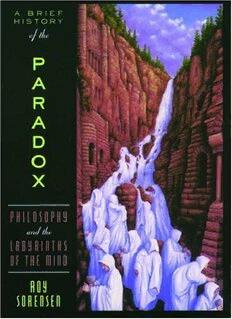Download A Brief History of the Paradox: Philosophy and the Labyrinths of the Mind PDF Free - Full Version
Download A Brief History of the Paradox: Philosophy and the Labyrinths of the Mind by Roy Sorensen in PDF format completely FREE. No registration required, no payment needed. Get instant access to this valuable resource on PDFdrive.to!
About A Brief History of the Paradox: Philosophy and the Labyrinths of the Mind
Can God create a stone too heavy for him to lift? Can time have a beginning? Which came first, the chicken or the egg? Riddles, paradoxes, conundrums--for millennia the human mind has found such knotty logical problems both perplexing and irresistible. Now Roy Sorensen offers the first narrative history of paradoxes, a fascinating and eye-opening account that extends from the ancient Greeks, through the Middle Ages, the Enlightenment, and into the twentieth century. When Augustine asked what God was doing before He made the world, he was told: ''Preparing hell for people who ask questions like that.'' A Brief History of the Paradox takes a close look at ''questions like that'' and the philosophers who have asked them, beginning with the folk riddles that inspired Anaximander to erect the first metaphysical system and ending with such thinkers as Lewis Carroll, Ludwig Wittgenstein, and W.V. Quine. Organized chronologically, the book is divided into twenty-four chapters, each of which pairs a philosopher with a major paradox, allowing for extended consideration and putting a human face on the strategies that have been taken toward these puzzles. Readers get to follow the minds of Zeno, Socrates, Aquinas, Ockham, Pascal, Kant, Hegel, and many other major philosophers deep inside the tangles of paradox, looking for, and sometimes finding, a way out. Filled with illuminating anecdotes and vividly written, A Brief History of the Paradox will appeal to anyone who finds trying to answer unanswerable questions a paradoxically pleasant endeavor.
Detailed Information
| Author: | Roy Sorensen |
|---|---|
| Publication Year: | 2005 |
| ISBN: | 9780195179866 |
| Pages: | 415 |
| Language: | English |
| File Size: | 2.647 |
| Format: | |
| Price: | FREE |
Safe & Secure Download - No registration required
Why Choose PDFdrive for Your Free A Brief History of the Paradox: Philosophy and the Labyrinths of the Mind Download?
- 100% Free: No hidden fees or subscriptions required for one book every day.
- No Registration: Immediate access is available without creating accounts for one book every day.
- Safe and Secure: Clean downloads without malware or viruses
- Multiple Formats: PDF, MOBI, Mpub,... optimized for all devices
- Educational Resource: Supporting knowledge sharing and learning
Frequently Asked Questions
Is it really free to download A Brief History of the Paradox: Philosophy and the Labyrinths of the Mind PDF?
Yes, on https://PDFdrive.to you can download A Brief History of the Paradox: Philosophy and the Labyrinths of the Mind by Roy Sorensen completely free. We don't require any payment, subscription, or registration to access this PDF file. For 3 books every day.
How can I read A Brief History of the Paradox: Philosophy and the Labyrinths of the Mind on my mobile device?
After downloading A Brief History of the Paradox: Philosophy and the Labyrinths of the Mind PDF, you can open it with any PDF reader app on your phone or tablet. We recommend using Adobe Acrobat Reader, Apple Books, or Google Play Books for the best reading experience.
Is this the full version of A Brief History of the Paradox: Philosophy and the Labyrinths of the Mind?
Yes, this is the complete PDF version of A Brief History of the Paradox: Philosophy and the Labyrinths of the Mind by Roy Sorensen. You will be able to read the entire content as in the printed version without missing any pages.
Is it legal to download A Brief History of the Paradox: Philosophy and the Labyrinths of the Mind PDF for free?
https://PDFdrive.to provides links to free educational resources available online. We do not store any files on our servers. Please be aware of copyright laws in your country before downloading.
The materials shared are intended for research, educational, and personal use in accordance with fair use principles.

